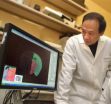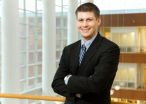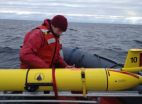Supply problems spark search for new ways to make magnets -- not the 'fridge' variety
2013-01-09
(Press-News.org) Mention magnets, and most people think of trivial applications of those pieces of metal, like holding family photos and reminder notes on the refrigerator. An article on magnets in the current edition of Chemical & Engineering News (C&EN), however, focuses on the critical role magnets play in the real world and the search for new materials to make them. C&EN is the weekly newsmagazine of the American Chemical Society, the world's largest scientific society.
In the article, C&EN Senior Correspondent Mitch Jacoby explains that magnets are crucial to an enormous number of products in the automobile, electronics, power-generation and clean energy industries. Those applications rely on advanced magnets made from rare-earth metals, which make the magnets much smaller and lighter than those made of other materials. But worldwide, it has been difficult to secure the supply of rare-earth metals that are used to make these powerful magnets, and prices for the source materials have fluctuated wildly.
Instead of hunting for completely new building blocks, some scientists are now developing methods to control known source materials on a finer scale. This approach could lead to more magnetism from less material. Still other scientists are responding to the challenge by exploring methods for extracting the valuable metals from already-used commercial products, essentially recycling the rare-earth magnets
###
The American Chemical Society is a nonprofit organization chartered by the U.S. Congress. With more than 164,000 members, ACS is the world’s largest scientific society and a global leader in providing access to chemistry-related research through its multiple databases, peer-reviewed journals and scientific conferences. Its main offices are in Washington, D.C., and Columbus, Ohio.
To automatically receive news releases from the American Chemical Society, contact newsroom@acs.org.
Follow us: Twitter Facebook END
ELSE PRESS RELEASES FROM THIS DATE:
2013-01-09
New Rochelle, NY, January 9, 2013—More than 85,000 synthetic chemicals are registered for commercial use with the U.S. Environmental Protection Agency (EPA), and only about half of those produced in large quantities are tested for their potential toxic effects on humans. Children are particularly vulnerable to environmental toxins and a detailed look at how and why, and what can be done to protect children's health, is presented in a two-part article published in Alternative and Complementary Therapies from Mary Ann Liebert, Inc., publishers. The articles are available ...
2013-01-09
Tree seeds, rather than biomass or fuel crop plants, could represent an abundant source of renewable energy, according to research published in the International Journal of Automotive Technology and Management. The study suggests that seeds from the Indian mahua and sal trees have almost as good a thermal efficiency as biodiesel but would produce lower emissions of carbon monoxide, waste hydrocarbons and NOx (nitrogen oxides).
Sukumar Puhan of the GKM College of Engineering and Technology and colleagues N. Vedaraman and K.C. Velappan of the Central Leather Research Institute, ...
2013-01-09
PITTSBURGH—Self-moving gels can give synthetic materials the ability to "act alive" and mimic primitive biological communication, University of Pittsburgh researchers have found.
In a paper published in the Jan. 8 print edition of the Proceedings of the National Academy of Sciences, the Pitt research team demonstrates that a synthetic system can reconfigure itself through a combination of chemical communication and interaction with light.
Anna Balazs, principal investigator of the study and Distinguished Professor of Chemical and Petroleum Engineering in Pitt's Swanson ...
2013-01-09
WINSTON-SALEM, N.C. – Jan. 9, 2013 – New research from Wake Forest Baptist Medical Center shows that patients suffering from aggressive brain tumors can be effectively treated with smaller radiation fields to spare the rest of the brain and preserve cognition.
"For patients with glioblastoma, we now know we can safely and effectively treat them with smaller radiation fields to spare the rest of their normal brain," said lead investigator Michael D. Chan, M.D., assistant professor of radiation oncology at Wake Forest Baptist. "That's important because it lessens the symptoms ...
2013-01-09
Alexandria, Va.–January 9, 2013– America Speaks, Volume 13, a compilation of public opinion polls commissioned by Research!America, features timely data about Americans' views on issues related to biomedical and health research. A majority of Americans (72%) say the new Congress and the President should take action to expand medical research within the first 100 days of the 113th Congress. Public support for increased government spending on medical research holds particular relevance as Congress considers whether to further delay, eliminate or permit "sequestration," a ...
2013-01-09
When researchers at Moffitt Cancer Center and colleagues conducted a random telephone survey among blacks, whites and Hispanics in New York, Baltimore and San Juan, Puerto Rico, they found that Hispanics are nearly twice as likely to report that fear of being used as a "guinea pig" and lack of trust in medical professionals contribute in being unwilling to participate in cancer screenings. The researchers concluded that health care providers need to do a better job of instilling trust and dispelling certain fears, particularly among Hispanics, to improve cancer screening ...
2013-01-09
AUGUSTA, Ga. – As we age, it just may be the ability to filter and eliminate old information – rather than take in the new stuff - that makes it harder to learn, scientists report.
"When you are young, your brain is able to strengthen certain connections and weaken certain connections to make new memories," said Dr. Joe Z. Tsien, neuroscientist at the Medical College of Georgia at Georgia Regents University and Co-Director of the GRU Brain & Behavior Discovery Institute.
It's that critical weakening that appears hampered in the older brain, according to a study in ...
2013-01-09
CHAMPAIGN, Ill. — Negative media coverage may prompt firms to engage in greater levels of strategic change than previously thought, according to research by a University of Illinois business professor.
While businesses have typically viewed the news media as a megaphone for publicity, businesses have not viewed the media as an influential stakeholder capable of shaping the strategic decisions of key executives, says Michael K. Bednar, a professor of business administration at Illinois.
"As the news media reports negatively about firms, that registers with executives," ...
2013-01-09
WASHINGTON — On average, Americans die sooner and experience higher rates of disease and injury than people in other high-income countries, says a new report from the National Research Council and Institute of Medicine. The report finds that this health disadvantage exists at all ages from birth to age 75 and that even advantaged Americans -- those who have health insurance, college educations, higher incomes, and healthy behaviors -- appear to be sicker than their peers in other rich nations.
"We were struck by the gravity of these findings," said Steven H. Woolf, professor ...
2013-01-09
Two robots equipped with instruments designed to "listen" for the calls of baleen whales detected nine endangered North Atlantic right whales in the Gulf of Maine last month. The robots reported the detections to shore-based researchers within hours of hearing the whales (i.e., in real time), demonstrating a new and powerful tool for managing interactions between whales and human activities.
The team of researchers, led by Woods Hole Oceanographic Institution (WHOI) scientists Mark Baumgartner and Dave Fratantoni, reported their sightings to NOAA, the federal agency responsible ...
LAST 30 PRESS RELEASES:
[Press-News.org] Supply problems spark search for new ways to make magnets -- not the 'fridge' variety



